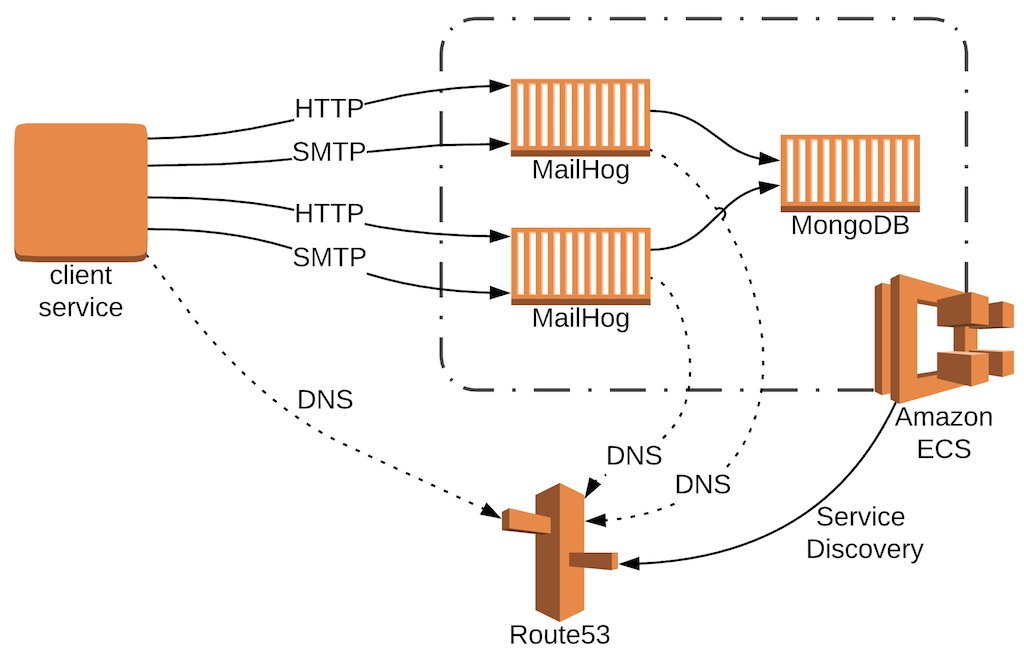MailHog on ECS + Service Discovery + CloudFormation
— Paul Annesley, July 2018
AWS announced Service Discovery for ECS a few months ago. It builds upon the Route 53 Auto Naming API announced a few months before that.
Clear documentation and examples for using it with CloudFormation are currently hard to find. Here’s a small but complete example of an ECS Service on Fargate using Service Discovery for internal and external discovery.
I’m using the fake/development mail server MailHog as an example. Thanks to David Looi at Culture Amp for his contributions to this.
This stack creates;
- A Fargate cluster,
- MailHog ECS service running four containers,
- MongoDB ECS service running one container,
- Service Discovery Private DNS Namespace;
mail.acme, - Service Discovery Service for MailHog;
smtp.mail.acme, - Service Discovery Service for MongoDB;
mongo.mail.acme.
The MailHog service will use mongo.mail.acme service discovery to locate MongoDB. And our external caller will use smtp.mail.acme to locate (and DNS-load-balance between) the MailHog services. We’ll test it via SMTP and HTTP API from an EC2 instance in the same VPC.
Here’s what we’re aiming for:

And here’s the CloudFormation template:
Pay special attention to the HealthCheckCustomConfig property on AWS::ServiceDiscovery::Service — it’s non-obvious, but omitting it leads to mysterious stack timeouts as describe in this AWS forum thread.
Description: MailHog on ECS with Service Discovery
Parameters:
SourceSecurityGroup:
Type: AWS::EC2::SecurityGroup::Id
Subnets:
Type: List<AWS::EC2::Subnet::Id>
VPC:
Type: AWS::EC2::VPC::Id
Resources:
Cluster:
Type: AWS::ECS::Cluster
Properties:
ClusterName: !Ref AWS::StackName
MailService:
Type: AWS::ECS::Service
Properties:
Cluster: !Ref Cluster
LaunchType: FARGATE
DesiredCount: 4
ServiceName: mailhog-mail
ServiceRegistries:
- RegistryArn: !GetAtt MailServiceDiscovery.Arn
TaskDefinition: !Ref MailTaskDefinition
NetworkConfiguration:
AwsvpcConfiguration:
Subnets: !Ref Subnets
SecurityGroups:
- !GetAtt MailServiceSecurityGroup.GroupId
MailServiceSecurityGroup:
Type: AWS::EC2::SecurityGroup
Properties:
GroupDescription: mailhog ECS task
SecurityGroupIngress:
- {ToPort: 1025, FromPort: 1025, IpProtocol: tcp, SourceSecurityGroupId: !Ref SourceSecurityGroup} # HTTP
- {ToPort: 8025, FromPort: 8025, IpProtocol: tcp, SourceSecurityGroupId: !Ref SourceSecurityGroup} # SMTP
VpcId: !Ref VPC
MailTaskDefinition:
Type: AWS::ECS::TaskDefinition
Properties:
RequiresCompatibilities: ["FARGATE"]
NetworkMode: awsvpc
Cpu: "256"
Memory: "0.5GB"
Family: !Ref AWS::StackName
ExecutionRoleArn: !GetAtt TaskExecutionRole.Arn
ContainerDefinitions:
- Name: mailhog
Image: mailhog/mailhog:latest
Environment:
- {Name: MH_STORAGE, Value: "mongodb"}
- {Name: MH_MONGO_URI, Value: "mongo.mail.acme:27017"}
MongoService:
Type: AWS::ECS::Service
Properties:
Cluster: !Ref Cluster
LaunchType: FARGATE
DesiredCount: 1
ServiceName: mailhog-mongo
ServiceRegistries:
- RegistryArn: !GetAtt MongoServiceDiscovery.Arn
TaskDefinition: !Ref MongoTaskDefinition
NetworkConfiguration:
AwsvpcConfiguration:
Subnets: !Ref Subnets
SecurityGroups:
- !GetAtt MongoServiceSecurityGroup.GroupId
MongoServiceSecurityGroup:
Type: AWS::EC2::SecurityGroup
Properties:
GroupDescription: mailhog ECS task
SecurityGroupIngress:
- {ToPort: 27017, FromPort: 27017, IpProtocol: tcp, SourceSecurityGroupId: !Ref MailServiceSecurityGroup}
VpcId: !Ref VPC
MongoTaskDefinition:
Type: AWS::ECS::TaskDefinition
Properties:
RequiresCompatibilities: ["FARGATE"]
NetworkMode: awsvpc
Cpu: "256"
Memory: "0.5GB"
Family: !Sub ${AWS::StackName}-mongo
ExecutionRoleArn: !GetAtt TaskExecutionRole.Arn
ContainerDefinitions:
- Name: mongo
Image: mongo:latest
TaskExecutionRole:
Type: AWS::IAM::Role
Properties:
AssumeRolePolicyDocument:
Version: 2012-10-17
Statement:
- {Action: "sts:AssumeRole", Effect: Allow, Principal: {Service: ecs-tasks.amazonaws.com}}
ManagedPolicyArns:
- arn:aws:iam::aws:policy/service-role/AmazonECSTaskExecutionRolePolicy
ServiceDiscoveryNamespace:
Type: AWS::ServiceDiscovery::PrivateDnsNamespace
Properties:
Name: mail.acme
Vpc: !Ref VPC
MailServiceDiscovery:
Type: AWS::ServiceDiscovery::Service
Properties:
Name: smtp
DnsConfig:
DnsRecords: [{Type: A, TTL: "10"}]
NamespaceId: !Ref ServiceDiscoveryNamespace
HealthCheckCustomConfig:
FailureThreshold: 1
MongoServiceDiscovery:
Type: AWS::ServiceDiscovery::Service
Properties:
Name: mongo
DnsConfig:
DnsRecords: [{Type: A, TTL: "10"}]
NamespaceId: !Ref ServiceDiscoveryNamespace
HealthCheckCustomConfig:
FailureThreshold: 1Fill in the blanks and launch the stack:
aws cloudformation create-stack \
--stack-name pda-mailhog \
--capabilities CAPABILITY_IAM \
--template-body="file://cloudformation.yaml" \
--parameters \
"ParameterKey=SourceSecurityGroup,ParameterValue=____" \
"ParameterKey=Subnets,ParameterValue=____" \
"ParameterKey=VPC,ParameterValue=____"Demo from EC2 in same VPC
Check the DNS provided by Service Discovery. There’s four ECS Tasks, so four A records.
[ec2-user@... ~]$ dig a smtp.mail.acme
...
;; QUESTION SECTION:
;smtp.mail.acme. IN A
;; ANSWER SECTION:
smtp.mail.acme. 10 IN A 10.0.147.126
smtp.mail.acme. 10 IN A 10.0.150.59
smtp.mail.acme. 10 IN A 10.0.145.36
smtp.mail.acme. 10 IN A 10.0.147.90
...Check MailHog’s API. The DNS resolver will pick one random-ish-ly:
[ec2-user@... ~]$ curl -s http://smtp.mail.acme:8025/api/v2/messages | jq .
{
"total": 0,
"count": 0,
"start": 0,
"items": []
}Deliver a message:
[ec2-user@... ~]$ nc -C smtp.mail.acme 1025
220 mailhog.example ESMTP MailHog
HELO pda
250 Hello pda
MAIL FROM:<paul@example.com>
250 Sender paul@example.com ok
RCPT TO:<melbourne@awsug.org.au>
250 Recipient melbourne@awsug.org.au ok
DATA
354 End data with <CR><LF>.<CR><LF>
From: "Paul Annesley" <paul@example.com>
To: <melbourne@awsug.org.au>
Date: Tue, 24 July 2018 23:10:00 +1000
Subject: Culture Amp is hiring!
Hello world!
.
250 Ok: queued as 2tNO5vtw8iium72EOzEP16TzYLg1ybYucF6E9wWOU1k=@mailhog.example
QUIT
221 ByeCheck MailHog’s API again:
[ec2-user@... ~]$ curl -s http://smtp.mail.acme:8025/api/v2/messages \
| jq '.items[0].Content.Headers.Subject[0]'
"Culture Amp is hiring!"